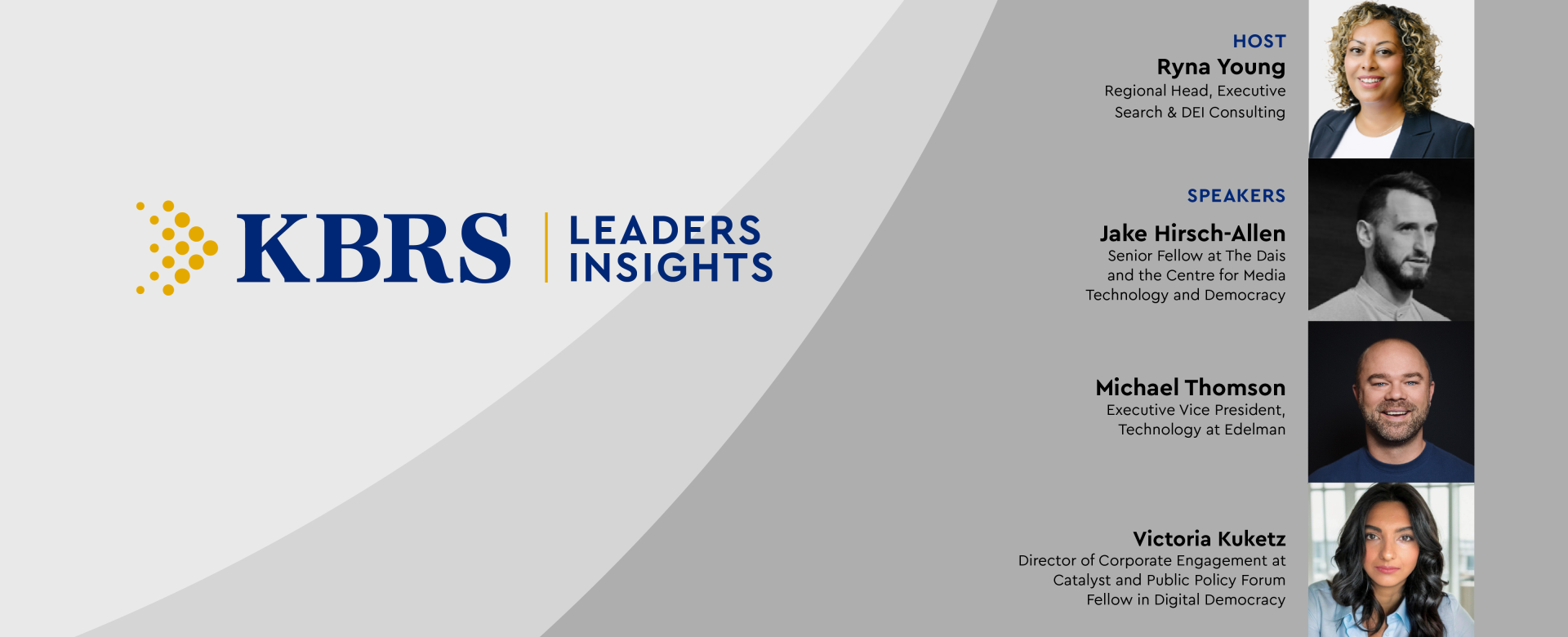As artificial intelligence (AI) rapidly permeates nearly every industry, leaders face a crucial challenge: how to effectively integrate these technologies into their organizations—or risk being left behind. Many leaders we speak with are either curious or concerned about how to embrace AI and maximize its potential to boost productivity and quality, while also maintaining ethical standards and enhancing workplace culture.
To address these pressing questions, KBRS recently hosted a panel of experts in the field of AI to explore the key strategies leaders should consider when navigating AI in their organizations. Several core themes emerged from this insightful conversation.
What is AI Really?
AI is often misunderstood, with many envisioning it as either futuristic or threatening. However, the reality is more nuanced. Panelist Jake Hirsch-Allen draws on the writings of past thought leaders in the AI space such as James Bard and Nicholas Carr to offer his modern definition of AI as a tool that comprises systems designed to perform tasks that typically require human intelligence, like pattern recognition, language processing, and decision-making—only done by computers. Jake also referenced Alan Turing, often considered the father of modern computer science, who in 1950 said, “A computer would deserve to be called intelligent if it could deceive a human into believing that it was human."
Understanding Employee Sentiments Through the Edelman Trust Barometer
The Edelman Trust Barometer, which is the largest global study of trust, reveals that employees’ feelings about AI and the future of work are mixed, marked by both optimism and caution. Trust is central, as many employees express concern over AI's impact on job security and fairness in the workplace, and according to Edelman’s findings, trust for AI in the workplace is very low globally. Despite this, according to Michael Thomson, Executive Vice President of technology at Edelman, “Leaders and organizations who have economic optimism about the future are 20 points more likely to embrace AI.”
It’s important to note that not all organizations and leaders are optimistic. The connection AI has to feeling optimistic about an organization and an employee’s role within it is still very much a work in progress.

The Importance of Responsible AI
AI has implications for nearly every aspect of how an organization is operated, including privacy, security, perceptions of truth, as well as workforce planning, upskilling and reskilling. With such far reaching impacts, accessible education may be the most important first step. Responsible AI is a proactive, ethics-led practice that must be at the foundation of development, integration, and operationalization at scale.

This includes establishing governance frameworks through governing bodies around the world like UNESCO and OECD, including people with diverse backgrounds in the conversations, and setting clear guidelines for AI applications. Staying focused on principles like those reflected in the Montreal Declaration for Responsible AI—well-being, respect for autonomy, protection of privacy and intimacy, solidarity, equity, diversity and inclusion, prudence, responsibility, and sustainable development—will protect humanity along these lines.
Advice for Harnessing AI’s Potential
Some of the key pieces of actional advice provided by the panellists include:
"According to findings at Edleman, 50% of Canadians feel unease or distrust about embracing AI and its impact on their work. To build this trust, and successfully embrace AI, education, empowerment, and deep consideration of the externalities are what will allow you to successfully implement AI within your workplace and beyond." - Michael Thomson
"Delaying the conversations about AI Is a recipe to fall behind. (AI) is going to happen. The question is, is it going to happen in a way that's going to be in service of your organization and society. And more broadly, are you going to let this passively shape you and your organization?" - Michael Thomson
"Don’t ban Chat GPT. Use it and other Gen AI programs as a sandbox to play. Use those tests to explore how it can be used in a wide variety of other areas. Don't have it write things for you, but instead, have it brainstorm for you." - Jake Hirsch-Allen
"Remember - it's not a human versus a computer. In that case, these days, the computer will usually win. It's actually a human plus a computer that equals, more powerful, more responsible, more important and better, more meaningful contributions for humanity." - Jake Hirsch-Allen
"Proceed with trust and a healthy skepticism. View AI as something that will empower you, something that will increase your productivity. But you can't take it at face value, because unfortunately, none of us are perfect, and neither is the technology. So, get more comfortable with it, but at the same time verify what you're getting from it and take responsibility again over what you're putting out there." - Victoria Kuketz
"Leaders also need to address the generational bias of older workers who are often perceived as resistant to change. That's a pretty bold assessment, in my opinion. And we really need to talk about how they can be upscaled around innovation because many of them are subject matter experts. They have great leadership capability, hold extensive subject matter expertise, and wisdom - so we really have to have an intergenerational lens around strategies going forward." - Victoria Kuketz
5 Key Questions Every Leader Needs to Ask Themself
As AI continues to evolve, leaders should be asking critical questions about its impact on their organizations and their teams. Here are some of the most important questions panellists believe leaders should be asking themselves:
Have you given your staff enough safety to be intrepid with this technology and encourage that swift and widespread adoption?
Is your strategy incorporating AI into the business in a responsible manner?
What skills or area of expertise do you have in-house, and what needs to be outsourced or developed internally?
Where do you have subject matter expertise that can be combined with the powers of AI to give you an advantage?
Have you created a culture that encourages entrepreneurial behaviour?
Conclusion
Navigating the complexities of AI in the workplace requires a strategic approach centered on education, ethics, communication, adaptability, and measurement. This conclusion is reinforced by the insights shared by the panel of experts. By fostering a culture of innovation and accountability, leaders can leverage AI to enhance organizational performance and drive meaningful change. The future of work is here, and embracing AI thoughtfully will empower leaders to lead their organizations into a new era of possibility.
Additional Resources on these themes referenced by the panellists include:
This article reflects the ideas and themes explored during a panel discussion hosted by KBRS on September 19, 2024, moderated by Ryna Young, ACC Regional Head, Executive Search and Diversity, Equity, and Inclusion Lead. Panelists included: Jake Hirsch-Allen, Senior Fellow at The Dais and the Centre for Media Technology and Democracy; Mike Thomson, Executive Vice President, Technology at Edelman; and Victoria Kuketz, Director of Corporate Engagement at Catalyst and Public Policy Forum Fellow in Digital Democracy.






